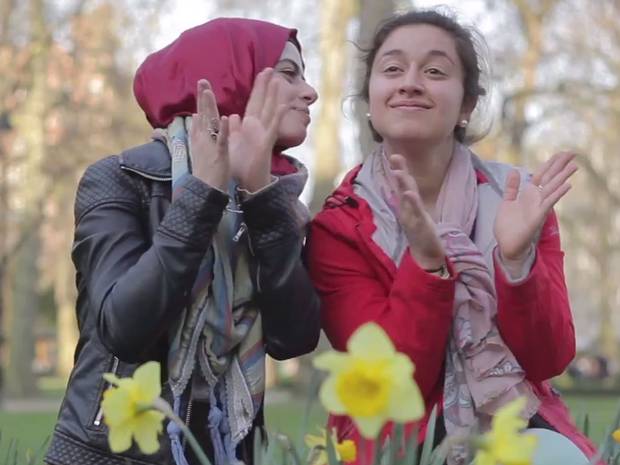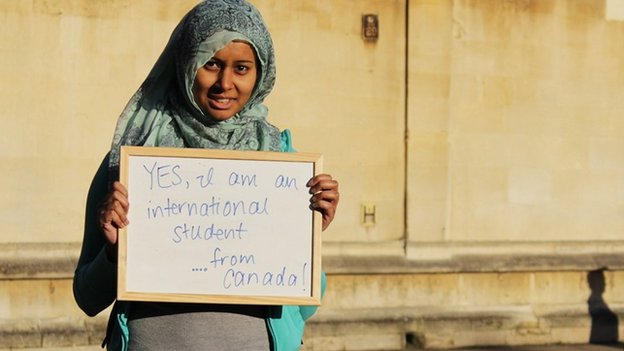Ever since American singer-songwriter Pharrell Williams released his song “Happy,” the Internet has been flooded with homemade videos from around the globe showcasing people dancing and singing along to the catchy song, every one of them sporting a contagious smile. Among these videos was a “Happy British Muslims!” video, released by the Honesty Policy which quickly made waves through the cyber world. Soon, a group of D.C. area Muslims got together to film their own version of this song.
We caught up with Lauren Schreiber, a participant, to ask about the “Happy” movement and the D.C. video.
![]() : How did you hear about the filming of the “Happy” video for D.C. Muslims?
: How did you hear about the filming of the “Happy” video for D.C. Muslims?
Lauren: The morning that the British Muslim’s “Happy” video came out, my Facebook timeline was buzzing with reposts of it and comments about how the American Muslim community should do something like this as well. One of the main organizers of MakeSpace, Hasan Shah, posted a message to see who would be interested in participating in a D.C. version of this video. The very next day, they had a Facebook event up, in partnership with MPAC [Muslim Public Affairs Council]. I think the whole process from the idea of filming an American version to the actual filming itself took about 48 hours. Social media makes things happen!
![]() : Why did you sign up to participate?
: Why did you sign up to participate?
Lauren: Because I’m happy! Honestly, I think it’s important to contribute to the expression of American Muslim identity. I hope that by participating in something like this, I am, in some small way, helping other Americans see our community as a part of the larger American culture, rather than reducing us to “the other.”
![]() : Do you think the video accurately represents the D.C. Muslim community?
: Do you think the video accurately represents the D.C. Muslim community?
Lauren: The individuals who came out did showcase the diversity within our community, but we certainly did not capture all of it. Since we filmed at 4:30 p.m. on a weekday, many folks who would have liked to participate couldn’t join in because of work or school commitments.
![]() : You must have heard of the criticism surrounding the British Muslim video. What are your thoughts on that?
: You must have heard of the criticism surrounding the British Muslim video. What are your thoughts on that?
Lauren: There certainly was no shortage of criticism, which seems to be typical for our community when it comes to creative expression amongst Muslims. It speaks volumes that virtually all of the criticism I saw came from fellow Muslims. It is disheartening and not because people disagree, but because so many of the detractors of the video failed to recognize that their opinions don’t represent all American Muslims. One of the things I love most about our community is how diverse we are. I know that my actions and choices, from the way I dress to my thoughts about music, don’t represent ALL American Muslims.
![]() :Do you personally feel there is any conflict between Islamic values and these “Happy” videos?
:Do you personally feel there is any conflict between Islamic values and these “Happy” videos?
Lauren: In my limited understanding of this faith, Islam is based on the belief in one God & Prophet Muhammad (pbuh) as the last and final messenger. This belief is rooted in an individual’s relationship with the Creator and manifests itself in the efforts of the believer to submit to the will of God. Already, there is uniqueness in our practice – it’s personal! This is why I am constantly praying for guidance and understanding. As far as music goes, I don’t believe it is forbidden or inherently evil – provided that the content or message is a healthy and moral one.
![]() : What do you have to say about the conversation surrounding women who appeared in the “Happy” video?
: What do you have to say about the conversation surrounding women who appeared in the “Happy” video?
Lauren: Women’s bodies and images are always being policed and criticized– by people of all faiths – thanks to patriarchal societies across the globe. My job is to represent my understanding of Islam the best way I can, to continue to seek knowledge and to not make this faith more complicated than it actually is. For now, I don’t see any conflict with Islam and “Happy” videos. It seems to me like we Muslims are simply in conflict with each other.
On an individual level, I take my hijab very seriously – my degree of modest dress and my attempt at “dancing” in the video are an honest reflection of what I’m comfortable with and how I practice my Islam on a daily basis. I understand that this sort of thing is not for everyone. I’m also generally a goofy person and can sometimes be caught dancing in public! This does not make me immodest or un-Islamic; it makes me human. To show that Muslims are human beings is a good thing to share with the world.
![]() : What message do you think the D.C. Muslim “Happy” video sends to viewers?
: What message do you think the D.C. Muslim “Happy” video sends to viewers?
Lauren: I hope that viewers get the same sort of vibe from this video as they would from all of the other “Happy” videos –that happiness is a universal experience, regardless of faith or background.

Photo Source: iacknowledge.net
![]() : More broadly, how do you think this reflects Muslim participation in pop culture?
: More broadly, how do you think this reflects Muslim participation in pop culture?
Lauren: I’m so glad to see that your question uses the term “pop culture” rather than “Western culture.” I’m American – born & raised. Some critics of the “Happy” videos argue that this is yet another way in which Muslims are assimilating into Western culture. This assumption is absurd and makes me mad! This is my culture. I am Muslim and American and I relate to the world through many mediums, including some aspects of popular culture. By engaging with the arts and mainstream media, Muslims have access to a brand new platform that can influence and change popular culture itself. I for one am happy that we have begun to join the larger conversation.
Lauren Schreiber is the outreach & events coordinator at the Council on American-Islamic Relations’ national headquarters in Washington, DC. She also serves on the board of the Islamic Research & Humanitarian Center of America (IRHSCA) in Maryland. Lauren is the co-founder of Fly Rebel, a non-profit arts consulting collective that supports the creation of socially responsible art in the Muslim community. Her work can be found at laurenschrieber.com.
Photo Credit: laurenschreiber.com
Hafsa Ahmad is a writer at atlMuslimah





